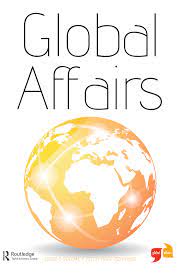The Complex Landscape of Global Affairs
Global affairs encompass a vast and intricate web of interactions, negotiations, and conflicts that shape the world we live in. From international diplomacy to trade agreements, from humanitarian crises to environmental challenges, the realm of global affairs is both fascinating and daunting.
At the heart of global affairs lies the interplay between nations, organisations, and individuals striving to navigate a complex landscape of power dynamics and competing interests. The decisions made at this level can have far-reaching consequences that impact not only countries but also entire regions and even the entire planet.
One of the key issues dominating global affairs today is the rise of populism and nationalism in various parts of the world. This trend has led to a resurgence of protectionist policies, strained international relations, and heightened tensions between countries. As borders become more fortified and alliances shift, the need for diplomacy and cooperation has never been more critical.
Another pressing issue in global affairs is climate change. The effects of global warming are being felt across the globe, from extreme weather events to rising sea levels. Addressing this existential threat requires coordinated efforts on a global scale, with nations coming together to implement sustainable practices and reduce carbon emissions.
Human rights violations, armed conflicts, economic disparities – these are just a few examples of the myriad challenges that define the landscape of global affairs. As we navigate these turbulent waters, it is essential for us to remain vigilant, informed, and engaged in shaping a more peaceful and prosperous world for all.
In conclusion, global affairs are a reflection of our interconnected world where actions taken in one corner can reverberate across continents. By understanding and actively participating in discussions around global issues, we can contribute towards building a more just and sustainable future for generations to come.
Understanding Global Affairs: Key Questions and Insights on International Relations, Globalisation, Diplomacy, Trade, and the United Nations
- What is the current state of international relations?
- How does globalisation impact global affairs?
- What are the major challenges facing global diplomacy today?
- How do trade agreements affect global economic stability?
- What role does the United Nations play in addressing global issues?
What is the current state of international relations?
The current state of international relations is characterised by a complex and dynamic landscape shaped by a multitude of factors. With the rise of populism, nationalism, and protectionism in several countries, traditional alliances are being tested, and new power dynamics are emerging. Tensions between major powers, such as the US, China, and Russia, continue to influence global affairs. Additionally, issues like climate change, cybersecurity threats, and global health crises have highlighted the interconnected nature of our world. Diplomatic efforts play a crucial role in navigating these challenges, as countries seek to balance their national interests with the need for multilateral cooperation. In this ever-evolving environment, understanding the nuances of international relations is essential for fostering dialogue and collaboration on a global scale.
How does globalisation impact global affairs?
Globalisation has a profound impact on global affairs by fostering interconnectedness and interdependence among nations. The increased flow of goods, services, capital, and information across borders has transformed the way countries interact and collaborate. Globalisation has facilitated the rise of multinational corporations, global supply chains, and international treaties that shape the economic, political, and social landscape of the world. While globalisation has led to economic growth and technological advancements, it has also sparked debates about inequality, cultural homogenisation, and environmental sustainability. Understanding how globalisation influences global affairs is essential for navigating the complexities of our interconnected world and addressing the challenges that arise from this interconnectedness.
What are the major challenges facing global diplomacy today?
In today’s complex world of global affairs, one of the most frequently asked questions revolves around the major challenges facing global diplomacy. From escalating geopolitical tensions and trade disputes to the rise of nationalist ideologies and the increasing threat of cyber warfare, diplomats are navigating a landscape fraught with obstacles. The need for effective communication, negotiation, and cooperation among nations has never been more critical as we strive to address pressing issues such as climate change, human rights violations, and international security threats. In this era of uncertainty and rapid change, the ability to forge meaningful diplomatic relationships and find common ground amidst diverse interests remains a paramount challenge for global diplomacy today.
How do trade agreements affect global economic stability?
Trade agreements play a crucial role in shaping global economic stability by influencing the flow of goods, services, and investments between countries. These agreements can impact various aspects of the economy, such as tariffs, quotas, and regulations, which in turn affect trade volumes and prices. By promoting free trade and reducing barriers to commerce, trade agreements can stimulate economic growth, create job opportunities, and foster innovation. However, they can also lead to challenges such as job displacement in certain industries or uneven distribution of benefits. The intricate interplay between trade agreements and global economic stability underscores the importance of carefully crafting and implementing policies that balance the interests of all stakeholders involved.
What role does the United Nations play in addressing global issues?
The United Nations plays a pivotal role in addressing global issues by serving as a platform for international cooperation and diplomacy. With its mandate to maintain peace and security, promote sustainable development, protect human rights, and uphold international law, the UN acts as a forum where countries can come together to discuss and find solutions to pressing global challenges. Through its various agencies, programmes, and initiatives, the United Nations works towards fostering dialogue, mediating conflicts, providing humanitarian aid, and advocating for policies that benefit all nations. Its efforts in promoting multilateralism and fostering collaboration among member states are crucial in tackling complex issues such as climate change, poverty alleviation, conflict resolution, and public health crises on a global scale.

